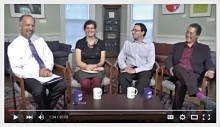Wheaton in miniature
When asked about my experiences thus far at Wheaton, I’m quick to let people know that I’m having the time of my life. And I mean it. One of the best parts of my role as president is the opportunity to participate in so many college events, on and off campus. For example, in recent weeks I have attended alumnae/i gatherings in a number of cities where faculty members offered short lectures on fascinating topics drawn from their teaching and research. Each of these outstanding events provided a perfect example of why I think Wheaton is such a special community.
The faculty members who presented at these events demonstrated the broad knowledge, teaching skill and innovative spirit for which Wheaton faculty are so well known. And they had wonderful audiences. The alumnae/i, parents and friends who attended the events were deeply engaged, asking great questions and adding to the discussion. It really was Wheaton at its best.
The presentations were both enlightening and thought-provoking. It felt as if we were in a real classroom at Wheaton. Each topic was drawn from our First-Year Seminars (FYS), a distinctive program that is now approaching its 30th anniversary. From the start, the FYS courses have offered students an introduction to college academic expectations in general, and to Wheaton’s interdisciplinary approach to the liberal arts in particular. Over that time, the program has become a staple of the Wheaton experience as well as a very clear example of the thoughtful way in which our faculty engage students and encourage them to take ownership of their education.
The program has evolved. When it began, the seminars were organized around the concept of revolutions. Over time, the program broadened its theme, first to focus on great controversies and now on topics of contemporary relevance and concern. Current courses include an exploration of our nation’s addiction to sugar, the rituals of meals, the seismic events of 1968, and the art of portraiture and self-portraiture from Rembrandt to Instagram.
The original idea remains unchanged. In addition to the strong commitment to interdisciplinary study, the seminars introduce the key elements of a Wheaton education. For example, the courses seek to engage students in learning inside and outside the classroom, to include project and group-learning and active modes of education. Most important, the close relationships between students and faculty that are Wheaton’s hallmark begin with FYS faculty members, who serve as advisors to new students until they declare a major.

In November, I had the chance during one of our Lyons Lunch and Learn sessions, my ongoing midday webcast series (available at wheatoncollege.edu/president), to talk with a panel of faculty members who lead sections of FYS. I particularly liked how Associate Professor of Psychology Michael Berg described the program.
“The energy of the First-Year Seminar is that it’s a microcosm of Wheaton,” Professor Berg said. “It’s all the resources of the college brought together. It’s the faculty-student connection, made deliberately so that every student gets it.”
What students get, ultimately, is a first-rate liberal arts education that will offer dividends for years to come, not only in their professional lives but personally as well. The goal of a Wheaton education, after all, is to help students develop the habits of mind to continue to learn and to have an abundant and satisfying intellectual life. The First-Year Seminar sets the stage for our students.
Associate Professor of Chemistry Laura Muller, who leads the faculty committee that now oversees the program, spoke recently in a video about her own First-Year Seminar and the goals that she has for students.
“What I want my students to develop as a result of this class is really a sense of ownership for asking questions and the sense that curiosity will be rewarded,” she said. “If you are curious, ask enough questions and you dive deep, you are going to have a much greater appreciation for the way the world works.”
Professor Muller’s comment is an eloquent statement about not only our goals for the First-Year Seminar but also for the impact of a Wheaton education.